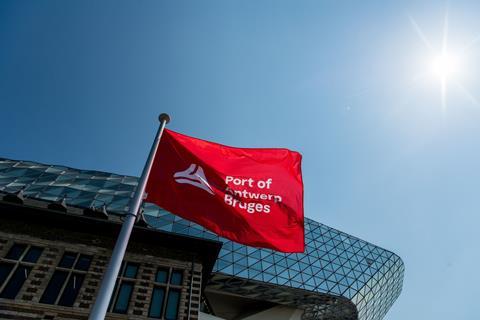Port ”holds its own” in a year full of geopolitical challenges as throughput falls slightly
The Port of Antwerp-Bruges has reflected on a difficult 2022 where its results were affected by a series of global challenges.

”Geopolitical tensions, the energy crisis and ongoing disruptions in supply chains made their presence felt and, in addition to shifts within the various commodity flows, put sustained pressure on the container segment,” the port noted.
These factors affected throughput, which was down 0.7 per cent year-on-year to 286.9m tonnes of cargo.
However, the port said that a ”flood of new investments and projects” confirmed the attractiveness of the unified group.
Container traffic
Container traffic in particular was affected in 2022, with global disruptions and the resulting congestion putting pressure on volumes.
In addition, the conflict in Ukraine caused a decrease in Russia-related traffic by 59 per cent.
”While operational challenges at container terminals and congestion have been slowly easing since the third quarter, high energy prices and economic uncertainty have caused a slowdown in demand for container traffic,” the port continued.
”As a result, container throughput fell 8.6 per cent in tons and 5.2 per cent in TEUs in 2022, compared with a strong 2021, back to pre-pandemic levels.”
Unified strength
Antwerp-Bruges stated that the resilience of both port platforms had allowed important steps to be taken in projects contributing to the port’s sustainable growth and its role in energy transition.
“2022 was, once again, an eventful year, with many logistical and geopolitical challenges,” said Jacques Vandermeiren, CEO Port of Antwerp-Bruges.
”As a world port, we are at the centre of this drama and are holding up well. Thanks to the complementarity of both platforms, we can already see the added value of the merger and, as a unified port, we are much stronger in the face of future challenges.
”Moreover, with our strong international position, we can make a difference in challenges such as the energy transition,” Vandermeiren explained. ”Together with our partners and thanks to financial support, such as the important European funding of €500m for the Antwerp and Kairois projects, we can live up to our pioneering role and realise climate impact that reaches far beyond the port’s borders.”
“The unified port is a global port that relies on a particularly close-knit port community,” said Annick De Ridder, vice-mayor of the City of Antwerp and president of the board of directors of Port of Antwerp-Bruges.
”All employees and companies that make up this port community showed tremendous resilience and strong resilience over the past year,” she outlined. ”As a result, we achieved a strong result despite very big challenges. The merger is proving its added value in practice.
”We are confident that in 2023 we can continue to focus on sustainable economic growth; certainly thanks to the many investments announced by our companies,” she added. ”In this way, our port is and will remain the economic engine of Flanders.”



